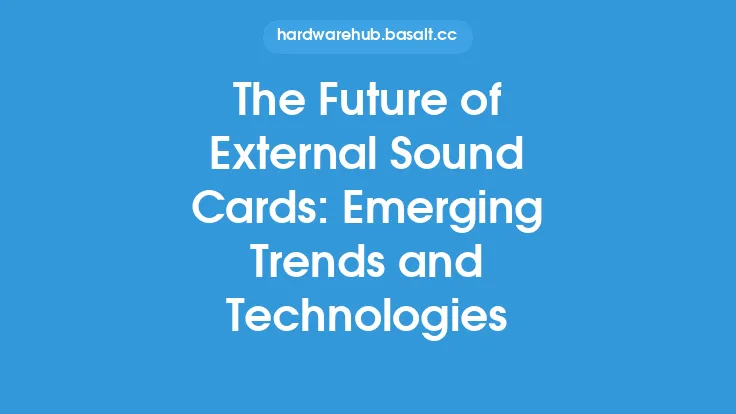The world of gaming is constantly evolving, and one of the most critical components of this evolution is the game controller. As technology advances, game controllers are becoming more sophisticated, offering enhanced gaming experiences and new ways to interact with games. In this article, we will explore the emerging trends and technologies that are shaping the future of game controllers.
Introduction to Emerging Trends
The future of game controllers is being driven by several emerging trends, including the adoption of advanced materials, the integration of artificial intelligence (AI), and the development of new input methods. One of the most significant trends is the use of advanced materials, such as carbon fiber and nanomaterials, which are being used to create lighter, stronger, and more durable controllers. These materials are also being used to create controllers with unique properties, such as self-healing and shape-memory abilities.
Advancements in Haptic Feedback
Another significant trend in game controllers is the development of advanced haptic feedback systems. Haptic feedback refers to the use of vibrations, textures, and other tactile sensations to create a more immersive gaming experience. Next-generation game controllers are incorporating advanced haptic feedback systems, including electroactive polymers (EAPs) and piezoelectric materials, which can simulate a wide range of sensations, from the feel of a virtual button to the sensation of walking on different textures. These systems are being used to create more realistic and engaging gaming experiences, and are also being used in other applications, such as virtual reality (VR) and augmented reality (AR) gaming.
The Role of Artificial Intelligence
Artificial intelligence (AI) is also playing a significant role in the development of next-generation game controllers. AI-powered controllers can learn a player's preferences and adapt to their playing style, providing a more personalized gaming experience. AI can also be used to analyze a player's performance and provide real-time feedback, helping them to improve their skills. Additionally, AI-powered controllers can be used to create more realistic and dynamic gaming environments, with AI-powered characters and objects that can interact with the player in a more realistic way.
The Emergence of New Input Methods
The future of game controllers is also being shaped by the emergence of new input methods, such as gesture recognition, voice recognition, and biometric sensing. Gesture recognition technology, for example, allows players to control games using hand or body gestures, while voice recognition technology allows players to control games using voice commands. Biometric sensing technology, on the other hand, allows players to control games using physiological signals, such as heart rate or brain activity. These new input methods are being used to create more intuitive and immersive gaming experiences, and are also being used in other applications, such as VR and AR gaming.
The Impact of Cloud Gaming
Cloud gaming is another trend that is having a significant impact on the development of game controllers. Cloud gaming refers to the ability to play games on any device, without the need for a dedicated gaming console or PC. This is made possible by the use of cloud-based servers, which can render games in real-time and stream them to any device with an internet connection. Cloud gaming is changing the way we play games, and is also changing the way we design game controllers. Next-generation game controllers are being designed to be more versatile and adaptable, with the ability to connect to multiple devices and platforms.
The Importance of Cross-Platform Compatibility
Cross-platform compatibility is another key trend in the development of game controllers. As games become more accessible across different platforms, there is a growing need for game controllers that can work seamlessly across multiple devices and platforms. Next-generation game controllers are being designed to be more versatile and adaptable, with the ability to connect to multiple devices and platforms. This is being achieved through the use of advanced wireless technologies, such as Bluetooth and Wi-Fi, which allow controllers to connect to devices without the need for cables or adapters.
The Future of Game Controller Design
The future of game controller design is also being shaped by emerging trends and technologies. Next-generation game controllers are being designed to be more ergonomic and comfortable, with advanced materials and designs that reduce fatigue and improve performance. They are also being designed to be more customizable, with interchangeable parts and adjustable settings that allow players to tailor their gaming experience to their individual preferences. Additionally, next-generation game controllers are being designed to be more sustainable, with eco-friendly materials and designs that reduce waste and minimize environmental impact.
Conclusion
In conclusion, the future of game controllers is being shaped by a range of emerging trends and technologies, including the adoption of advanced materials, the integration of AI, and the development of new input methods. As technology continues to evolve, we can expect to see even more innovative and sophisticated game controllers that offer enhanced gaming experiences and new ways to interact with games. Whether you're a casual gamer or a hardcore enthusiast, the future of game controllers is sure to be exciting, with new and innovative technologies that will take your gaming experience to the next level.





